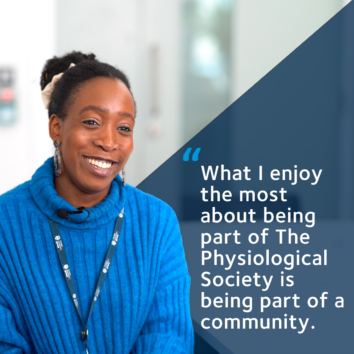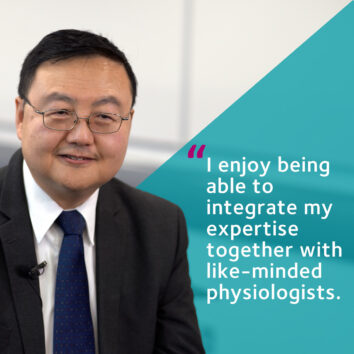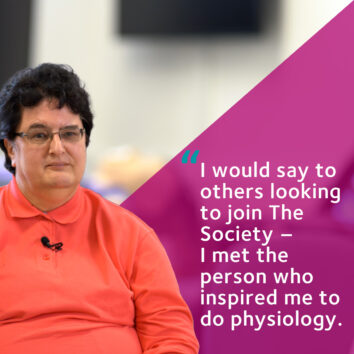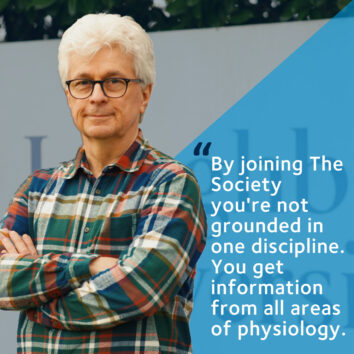

Dr Samantha Rowland
The Physiological Society has supported me throughout my career to date, moving me from a PhD position to a postdoc, and I'll soon be starting a lectureship at Loughborough
Career journey
Dr Samantha Rowland graduated from Loughborough University with a First Class Honours degree in Sport and Exercise Science in 2016. She was awarded two prizes in recognition of her academic achievements on the undergraduate programme. Dr Rowland then continued her studies at Loughborough, with the support of the Santander Postgraduate UK/EU scholarship and in 2017, graduated with a Distinction from the MSc in Exercise Physiology programme. Rowland then remained at the university and undertook a five-year position as a Postgraduate University Teacher (PGUT) in Physiology within School of Sport, Exercise and Health Sciences. During this time, she became a Fellow of the Higher Education Academy. Alongside her role as a PGUT, Rowland studied part-time for a PhD in the area of dietary nitrate supplementation, cardiovascular health, and exercise performance.
In October 2022, Rowland was appointed to the position of Research Associate within Dr Liam Heaney’s research group. Her project assesses the impact of an orally ingested multi-strain probiotic product on the gut microbiome and physical and biochemical measurements of exercise performance and recovery.

Hear from Dr Samantha Rowland
Questions and Answers
What inspired you to work and/or study exercise physiology?
Probably my background in sport. From a young age I was involved in aerobic gymnastics. I was training regularly and competing nationally and internationally. At the moment, I’m working on a project looking at the effects of a novel multi-strain probiotic product on exercise performance and recovery from a muscle damaging bout of exercise.
What do you enjoy the most about working as an exercise physiologist?
The variety of the job! I love that I get to be involved in the labs, interacting with participants and collecting data. I also really love teaching exercise physiology. The practical classes can really bring the theoretical content to life, and the students really enjoy those.
There are so many interesting topics that are being investigated in this space at the moment, but one of the topic areas I’m particularly interested in, is around the gut physiology in the female athlete.
What’s been the biggest challenge about working in exercise physiology?
The biggest challenge about working in exercise physiology is probably the instability of trying to get into a role in physiology. The advice I would give to somebody looking to work in exercise physiology is to gain experience of working, both in industry and in academia. Try and gain that practical experience with industry to see if you want to be an applied practitioner, but also gain some experience with research and teaching.
Why do you think exercise physiology is important as a career?
Exercise physiology research helps us live longer and healthier lives because it covers multiple areas. It covers areas such as physical activity and sedentary behaviour to cardiovascular health, disease prevention, and ageing.
What inspired you to join as a member of The Physiological Society?
My colleagues at Loughborough University inspired me to become a member. They strongly recommended that I join the society for the benefits of its grants, conferences and workshops.
What do you enjoy the most about being a member of The Physiological Society?
The workshops have been fantastic, I’ve attended two of them so far, and I hope to attend more of them in future. It’s also exciting the number of grants offered by The Physiological Society, which in the coming years, I’m looking to explore and apply for.
What have you found most beneficial being a member of The Society?
The Variability workshop last year was excellent, as part of this workshop, I was able to submit an abstract and receive feedback on some of my work from experts in the field of variability.
How has being a member of The Physiological Society helped support you throughout your career?
The Physiological Society has supported me as an exercise physiologist by hosting a variety of workshops. These have been really informative in shaping my current work as a postdoc, but also my previous work as a PhD student. Being able to put on my CV that I’ve attended workshops delivered by The Physiological Society is something that has really helped me get to where I am today.
What would you say to others looking to join The Society?
What I would say to anybody looking to join The Physiological Society is, is do it. I’ve had a really good experience with The Physiological Society to date, their workshops, conferences and also their grant opportunities are brilliant.
Timeline
2013-2016
BSc Sport and Exercise Science, Loughborough University
2016-2017
MSc Exercise Physiology, Loughborough University
2018-2022
Part time PhD and Postgraduate University Teacher, Loughborough University
2022-2024
Postdoctoral Researcher, Loughborough University
July 2024 onwards
Lecturer in the School of Sport, Exercise and Health Sciences, Loughborough University
Dr Samantha Rowland
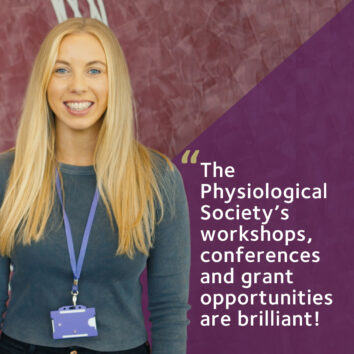
Timeline
2013-2016
BSc Sport and Exercise Science, Loughborough University
2016-2017
MSc Exercise Physiology, Loughborough University
2018-2022
Part time PhD and Postgraduate University Teacher, Loughborough University
2022-2024
Postdoctoral Researcher, Loughborough University
July 2024 onwards
Lecturer in the School of Sport, Exercise and Health Sciences, Loughborough University
